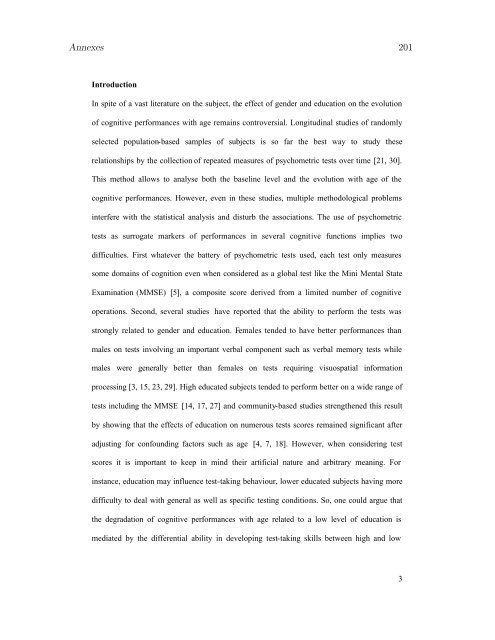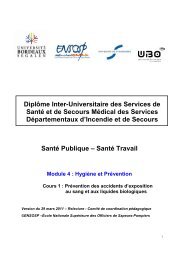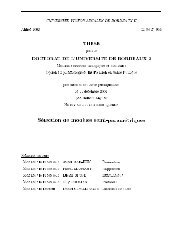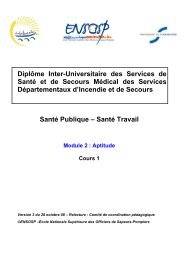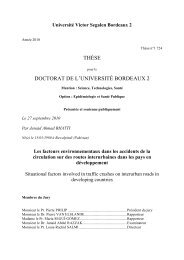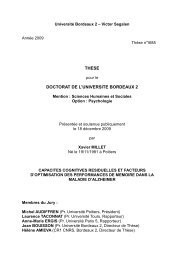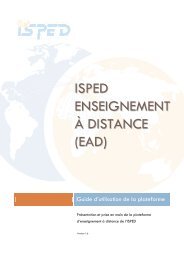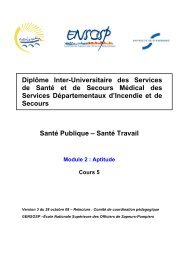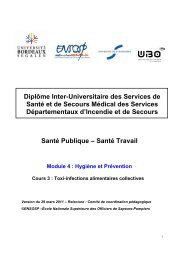- Page 1 and 2:
Université Victor Segalen Bordeaux
- Page 3 and 4:
3RemerciementsA Monsieur Jean-Louis
- Page 5 and 6:
5Un immense merci à tous ceux que
- Page 7 and 8:
7A Delphine et ses mille et une his
- Page 9 and 10:
TABLE DES MATIÈRES 92.3.2 Estimati
- Page 11 and 12:
TABLE DES MATIÈRES 116.3.1 Adéqua
- Page 13 and 14:
Introduction 13ans atteintes d’un
- Page 15 and 16:
Introduction 15Mais, pour l’insta
- Page 17 and 18:
Introduction 171.2 Problèmes méth
- Page 19 and 20:
Introduction 191.2.3 Association en
- Page 21 and 22:
Introduction 21QUID suggère que le
- Page 23 and 24:
Chapitre 2Etat des connaissancesCe
- Page 25 and 26:
Etat des connaissances 25Plusieurs
- Page 27 and 28:
Etat des connaissances 27Prise en c
- Page 29 and 30:
Etat des connaissances 29Extensions
- Page 31 and 32:
Etat des connaissances 31données s
- Page 33 and 34:
Etat des connaissances 33variables
- Page 35 and 36:
Etat des connaissances 35(2000) ne
- Page 37 and 38:
Etat des connaissances 372.3 Modél
- Page 39 and 40:
Etat des connaissances 39chapitre 3
- Page 41 and 42:
Etat des connaissances 41de mélang
- Page 43 and 44:
Etat des connaissances 43Hawkins et
- Page 45 and 46:
Etat des connaissances 45tique de d
- Page 47 and 48:
Etat des connaissances 47L’estima
- Page 49 and 50:
Etat des connaissances 49normales s
- Page 51 and 52:
Etat des connaissances 512.4 Modél
- Page 53 and 54:
Etat des connaissances 53en tant qu
- Page 55 and 56:
Etat des connaissances 55interactio
- Page 57 and 58:
Etat des connaissances 57décrite p
- Page 59 and 60:
Etat des connaissances 59entre l’
- Page 61 and 62:
Etat des connaissances 612.4.3 Cas
- Page 63 and 64:
Etat des connaissances 63l’inform
- Page 65 and 66:
Modèle nonlinéaire à processus l
- Page 67 and 68:
Modèle nonlinéaire à processus l
- Page 69 and 70:
Modèle nonlinéaire à processus l
- Page 71 and 72:
Modèle nonlinéaire à processus l
- Page 73 and 74:
Modèle nonlinéaire à processus l
- Page 75 and 76:
Modèle nonlinéaire à processus l
- Page 77 and 78:
Modèle nonlinéaire à processus l
- Page 79 and 80:
Modèle nonlinéaire à processus l
- Page 81 and 82:
Modèle nonlinéaire à processus l
- Page 83 and 84:
Modèle nonlinéaire à processus l
- Page 85 and 86:
Modèle nonlinéaire à processus l
- Page 87 and 88:
Modèle nonlinéaire à processus l
- Page 89 and 90:
Modèle nonlinéaire à processus l
- Page 91 and 92:
Modèle nonlinéaire à processus l
- Page 93 and 94:
Chapitre 4Modèle nonlinéaire à c
- Page 95 and 96:
Modèle nonlinéaire à classes lat
- Page 97 and 98:
Modèle nonlinéaire à classes lat
- Page 99 and 100:
Modèle nonlinéaire à classes lat
- Page 101 and 102:
Modèle nonlinéaire à classes lat
- Page 103 and 104:
Modèle nonlinéaire à classes lat
- Page 105 and 106:
Modèle nonlinéaire à classes lat
- Page 107 and 108:
Modèle nonlinéaire à classes lat
- Page 109 and 110:
Modèle nonlinéaire à classes lat
- Page 111 and 112:
Modèle nonlinéaire à classes lat
- Page 113 and 114:
Modèle nonlinéaire à classes lat
- Page 115 and 116:
Modèle nonlinéaire à classes lat
- Page 117 and 118:
Modèle nonlinéaire à classes lat
- Page 119 and 120:
Modèle nonlinéaire à classes lat
- Page 121 and 122:
Modèle nonlinéaire à classes lat
- Page 123 and 124:
Modèle nonlinéaire à classes lat
- Page 125 and 126:
Modèle nonlinéaire à classes lat
- Page 127 and 128:
Modèle nonlinéaire à classes lat
- Page 129 and 130:
Modèle nonlinéaire à classes lat
- Page 131 and 132:
Modèle nonlinéaire à classes lat
- Page 133 and 134:
Modèle nonlinéaire à classes lat
- Page 135 and 136:
Modèle nonlinéaire à classes lat
- Page 137 and 138:
Modèle nonlinéaire à classes lat
- Page 139 and 140:
Modèle nonlinéaire à classes lat
- Page 141 and 142:
Modèle nonlinéaire à classes lat
- Page 143 and 144:
Modèle nonlinéaire à classes lat
- Page 145 and 146:
Modèle nonlinéaire à classes lat
- Page 147 and 148:
Modèle nonlinéaire à classes lat
- Page 149 and 150: Chapitre 6Discussion et perspective
- Page 151 and 152: Discussion et perspectives 151la pr
- Page 153 and 154: Discussion et perspectives 153Varia
- Page 155 and 156: Discussion et perspectives 1556.2 M
- Page 157 and 158: Discussion et perspectives 157à cl
- Page 160 and 161: Discussion et perspectives 160effet
- Page 162 and 163: Discussion et perspectives 162Dans
- Page 164 and 165: Chapitre 7BibliographieAmieva, H.,
- Page 166 and 167: Bibliographie 1661, S19-25.Brown, E
- Page 168 and 169: Bibliographie 168Sons, New-York.Fol
- Page 170 and 171: Bibliographie 170Hogan, J. W. et La
- Page 172 and 173: Bibliographie 172Lin, H., McCulloch
- Page 174 and 175: Bibliographie 174Park, CA.Muthén,
- Page 176 and 177: Bibliographie 176Schlattmann, P. (2
- Page 178 and 179: Bibliographie 178in the random-effe
- Page 180 and 181: Chapitre 8Annexes8.1 Liste des publ
- Page 182 and 183: Annexes 182Pau (France)Communicatio
- Page 184 and 185: Annexes 184166 C. Proust, H. Jacqmi
- Page 186 and 187: Annexes 186168 C. Proust, H. Jacqmi
- Page 188 and 189: Annexes 188170 C. Proust, H. Jacqmi
- Page 190 and 191: Annexes 190172 C. Proust, H. Jacqmi
- Page 192 and 193: AnnexesAmerican Journal of Epidemio
- Page 194 and 195: Annexes 194Psychometric Tests’ Se
- Page 196 and 197: Annexes 196Psychometric Tests’ Se
- Page 198 and 199: Annexes 198Psychometric Tests’ Se
- Page 202 and 203: Annexes 202educated subjects. This
- Page 204 and 205: Annexes 204(iii) the recognition fo
- Page 206 and 207: Annexes 206Explanatory variablesIn
- Page 208 and 209: Annexes 208IST15 (median=28, IQR=24
- Page 210 and 211: Annexes 210and on the mean evolutio
- Page 212 and 213: Annexes 212These findings should be
- Page 214 and 215: Annexes 214Appendix : model specifi
- Page 216 and 217: Annexes 216References[1] Amieva H,
- Page 218 and 219: Annexes 218[19] Letenneur L, Commen
- Page 220 and 221: Annexes 220Figure 1 : (A) Predicted
- Page 222 and 223: Annexes 222Table 1: demographic and
- Page 224: Annexes 224MMSE 0.0037 * 0.0013,0.0


